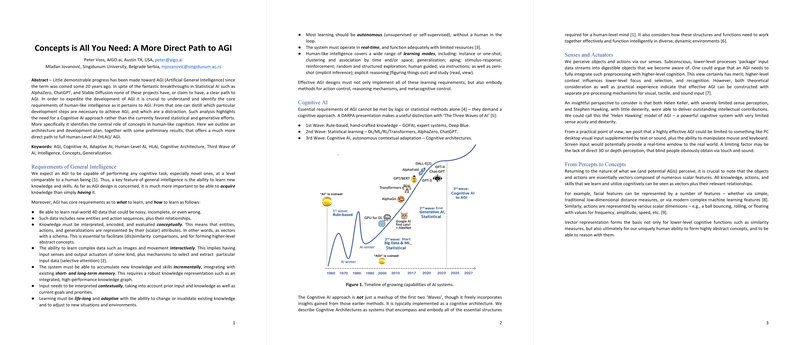Concepts Is All You Need: A More Direct Path to AGI
The paper "Concepts is All You Need: A More Direct Path to AGI" by Peter Voss and Mlađan Jovanović presents a critical analysis of the current trajectory of AI research, particularly the ambitious goal of achieving AGI. By emphasizing the significance of a Cognitive AI approach over the prevalent Statistical AI methods, the authors propose a recalibration of AI development priorities. Their work scrutinizes the fundamental requirements of human-level intelligence and proposes a developmental roadmap that sheds light on an architectural and methodological shift necessary for AGI.
Core Requirements for AGI
The paper asserts that AGI should exhibit the ability to perform any cognitive task at a level comparable to humans, particularly novel tasks, by dynamically learning new knowledge and skills. The authors outline several core requirements that must be met:
- Capability to process real-world, potentially noisy, and incomplete data.
- Conceptual evaluation of entities, actions, and their relationships as vector-based representations.
- Incremental integration of new knowledge with existing memory, enhancing short- and long-term cognitive processes.
- Contextual interpretation of inputs considering current goals.
- Emphasis on autonomous learning that is real-time, resource-efficient, and minimally reliant on human supervision.
These requirements, the paper argues, necessitate more than statistical and generative AI capabilities, advocating a fundamentally cognitive approach.
Cognitive AI: Third Wave of AI
Voss and Jovanović describe Cognitive AI as the third-wave paradigm, succeeding rule-based systems (first wave) and statistical learning (second wave). They propose a cognitive architecture that embodies the essential structural and functional elements of a human-like mind. This approach integrates insights from earlier AI methods while facilitating a more coherent and dynamic adaptation to diverse environments. The notion is that efficient AGI requires a strongly integrated system where perception, memory, generalization, and reasoning are intricately connected.
Knowledge Representation and Implementation
The paper underscores the importance of robust knowledge representation via a memory-based knowledge graph, arguing against the utility of external graph databases due to real-time performance constraints. Instead, an integrated, highly optimized graph-based vector datastore is advocated as the fundamental substrate for all cognitive functions, facilitating both long-term and short-term memory. This setup is intended to support the complex interplay of cognitive processes required for AGI, achieving performance benchmarks significantly outperforming traditional database systems.
Metacognition and Emotions
The discussion extends into metacognition and the role of cognitive emotions in AGI. The capacity for complex, higher-order cognition alongside subconscious processes is emphasized, drawing parallels to Kahneman’s dual-system model of human cognition. The ability of AGI to manage and utilize such cognitive emotions could enhance intelligent behaviors and adaptive learning.
Practical Implementations and Roadmap
The AIGO project, a focal point of the paper, is presented as an ongoing effort that exemplifies the proposed Cognitive AI approach through several AGI prototypes developed over two decades. A comparative benchmark, particularly in contextual question answering, highlights the efficacy of the AIGO system relative to contemporary models like ChatGPT-4. The roadmap laid out in the paper delineates iterative enhancements for the AIGO architecture, focusing on integrating multimodal inputs, advanced language capabilities, and autonomous learning towards a truly general intelligence.
Implications and Future Directions
The implications of this research are profound, suggesting a redirected focus within AI research communities toward cognitive architectures and knowledge representation systems that prioritize real-time adaptability and conceptual learning. Prospective advancements could enrich numerous AI applications, particularly those demanding high-level reasoning, adaptability, and an understanding of conceptual relationships. Future work is likely to explore deeper integration of multimodal learning and refinement of metacognitive processes as pivotal elements in achieving comprehensive AGI capabilities.
In summary, "Concepts is All You Need: A More Direct Path to AGI" presents an incisive argument for the reorientation of AGI research. By delineating the requirements and characteristics of a Cognitive AI framework, Voss and Jovanovic offer a visionary yet pragmatic pathway towards realizing the full potential of artificial general intelligence.
